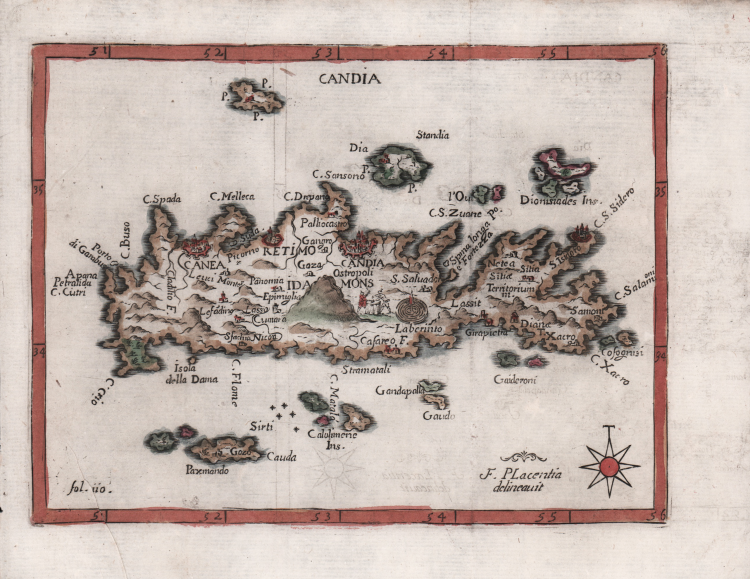



| Reference: | S47358 |
| Author | Francesco PIACENZA |
| Year: | 1688 |
| Zone: | Creta |
| Printed: | Modena |
| Measures: | 185 x 140 mm |


| Reference: | S47358 |
| Author | Francesco PIACENZA |
| Year: | 1688 |
| Zone: | Creta |
| Printed: | Modena |
| Measures: | 185 x 140 mm |
Rare map of the island by Francesco Piacenza, published in the L’Egeo Redivivo o’sia Chrorographia dell’Arcipelago, e dello stato primiero, & attuale di quell’isole, regni, città, populationi, dominii, costumi, sito & imprese, con la breve descrittione particolare sì del suo ambito littorale, che della Grecia, Morea, o’Peloponnese, di Candia, e Cipri, printed in Modena by Soliani Heirs, 1688.
The work, a kind of "Isolario" in the 16th century Venetian tradition, includes a very thorough and systematic description of the islands of the Aegean, Crete, Cyprus and the Peloponnese. The descriptions of each island are very detailed regarding the terrain, location of towns and villages, churches and monasteries. They mention the presence of ancient ruins and provide information about medieval history. Lesser-known islands are particularly well treated.
“Piacenza's work on the Archipelago was inspired by the Venetian successes in the Morea against the Turks from 1684-1688. He describes each island, and according to his own testimony claims to have visited all the islands he describes. He also claims to have drawn all the maps himself. Certainly the book is full of useful information on the nature of each island and its antiquities, and Piacenza gives the sources for his information, both ancient and contemporary. Following the titles of certain maps, we have added place names, separated by a slash, which occur on the maps themselves so that additional islands can be located. For the most part Piacenza uses a double system of place-names for his maps: he uses the modern name of the island in the title at the upper edge of the plate, but he uses the ancient place names on the map itself. The maps are all in the letterpress except for four: Morea, Candia, Arcipelago and Cipro” (cfr. G. Tolias, Mapping Greece, 1420-1800: A History Maps in the Margarita Samourkas Collection, p. 508).
Francesco Piacenza Napolitano, [born in Naples in 1637 and died in Modena in 1687], was a doctor of civil and canon law and professor of geography; he was also secretary to His Catholic Majesty's ambassador to Germany for 8 years, then to Bologna as secretary to Bishop Cardinal Guzman. He became a member of the "Accademia degli Immobili Dissonanti" and attended the newly founded University of Modena where he took the Natural Sciences course that included, for the first time, the study of chemistry. He was commissioned by the Duke of Modena Francesco II de Este to travel to the Aegean and make a description and map of it; unfortunately, he died before the publication of "L'Egeo redivivo" in 1688.
Etching, printed on contemporary laid paper and finely hand coloured, with margins, in good condition.
Bibliografia
C. Zacharakis, A Catalogue of Printed Maps of Greece 1477-1800, pp. 236-241, nn. 2628-2690; G. Tolias, Mapping Greece, 1420-1800: A History Maps in the Margarita Samourkas Collection, pp. 508-509, nn. 1118-1179.
Francesco PIACENZA (Napoli, 1637 – Modena, 1687)
|
Francesco Piacenza (Naples, 1637 - Modena, 1687) was an Italian cartographer, jurist and chess player.
A doctor of civil and canon law, he was secretary to HM Catholic ambassador to Germany for eight years. In Bologna he was secretary to Prince Guzman when Cardinal Boncompagni was bishop of the city. In 1683 he published, in Turin, the treatise I Campeggiamenti negli Scacchi, ossia nuova disciplina d'attacchi, difese e partiti del giuoco nello stile antico, che nel nuovo arciscacchiere, stratagemmi ed invenzioni. He traveled extensively in Italy and abroad playing just about everywhere even with money stakes. He was a specialist in acts with marked pieces or in marked houses. He invented an archiscaster of 100 houses with two new pieces: the Centurion and the Decurion.
Member of the Accademia degli Immobili at the University of Modena where he taught a naturalistic course in 1686-87. After a study trip to the Aegean islands he wrote L'Egeo Redivivo, that is, a chorography of the archipelago and the ancient and present state of those islands, published posthumously in Modena in 1688.
|
Francesco PIACENZA (Napoli, 1637 – Modena, 1687)
|
Francesco Piacenza (Naples, 1637 - Modena, 1687) was an Italian cartographer, jurist and chess player.
A doctor of civil and canon law, he was secretary to HM Catholic ambassador to Germany for eight years. In Bologna he was secretary to Prince Guzman when Cardinal Boncompagni was bishop of the city. In 1683 he published, in Turin, the treatise I Campeggiamenti negli Scacchi, ossia nuova disciplina d'attacchi, difese e partiti del giuoco nello stile antico, che nel nuovo arciscacchiere, stratagemmi ed invenzioni. He traveled extensively in Italy and abroad playing just about everywhere even with money stakes. He was a specialist in acts with marked pieces or in marked houses. He invented an archiscaster of 100 houses with two new pieces: the Centurion and the Decurion.
Member of the Accademia degli Immobili at the University of Modena where he taught a naturalistic course in 1686-87. After a study trip to the Aegean islands he wrote L'Egeo Redivivo, that is, a chorography of the archipelago and the ancient and present state of those islands, published posthumously in Modena in 1688.
|